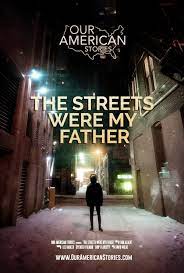
THE STREETS WERE MY FATHER
US, 2021, 72 minutes, Colour.
Carlos Colon, Louis Dooley, Leslie Williams.
Directed by Don Albert.
Three American men take the opportunity to tell their life story to camera, articulate and moving in their presentation of themselves, great honesty, and some visuals as background to their stories.
The intention of the documentary is very clear with the information and statistics presented at the end. The information highlights the number of prisoners in US prisons, over 2 million, and a high percentage of them male. And there are statistics about prisoners, those in juvenile detention, runaways… And how the high percentage of these did not have fathers.
And this is a key theme as the men recall their lives, absent fathers, harsh fathers, fathers murdered in drug deals… The director also made a documentary two years earlier, I Never Knew My Father.
The three men tell their stories from the vantage point of the late 2010s, one of them, Leslie Williams, in his 60s, is that they are able to tell their story, with emotion, but more objectively, enabling the audience to understand how they felt as children, their home situation, opportunities for education or not, the impact of fathers and father’s absence, inadequacies of mother’s care, the attraction of gangs and life in the streets in their mid-teens, greater involvement in the gang life, stealing, violence, drug dealing, and, with two of them, murders.
Initially, the conversations have no major religious focus. It is only in prison when they reflect on their lives, having served long years of sentence, children, possibilities for marriage, some opportunities arising to reflect on their future, better lives, the religious dimensions, the discovery of some presence of God, even God becoming a father-figure.
The men have strong, persuasive and convincing personalities as they speak to camera.
The men have served long sentences, become more religious, becoming more involved in ministry to prisoners, and a scene of forgiveness and reconciliation by the father of a murdered man.
This is obviously a documentary for reflecting on men, the role of a father, absence, consequences and crime, reflection on prison life, possibilities for rehabilitation. The language of the film is very much Jesus-focused, God’s Word, rather than the experience of church.
Obviously a film for those in prison, those with social concern and care, chaplains, and a film for family and friends of those in prison.